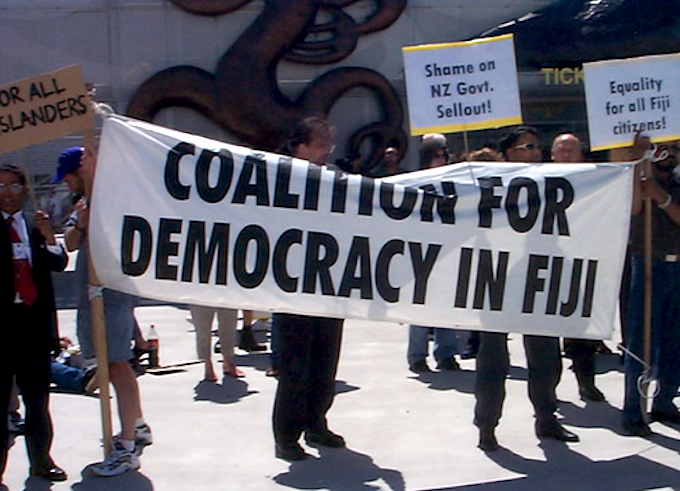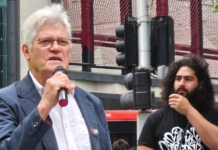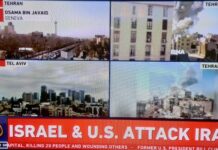
COMMENT: Nik Naidu reflects on the 33rd anniversary of the original – first of four – coups in his homeland of Fiji.
Today is the 33rd anniversary of that fateful day when Fiji lost its political innocence, when the Fiji military overthrew a democratically elected “People’s government”.
Yes, 33 years have passed.
That first military coup on 14 May 1987, backed by failed politicians and Fiji’s indigenous and business power-elite, has since been repeated over and over.
READ MORE: Second coup in 1987 – Fiji coup leader declares republic
And quite likely, the “coup culture”, as it is commonly referred to, will continue to plague Fiji’s future.
Now, in 2020, Fiji continues as a failed democracy.
And if unchecked, Fiji will end up joining the long list of the world’s other failed military-backed states.
Here are some sad facts, most of which have accelerated over the last 33 years, and are directly linked to the military coups:
- Around 50 percent of Fiji’s 1 million residents live in dire poverty, earning less than $25 a week
- 50 percent of Fijians do not have access to safe drinking water and proper sanitation
- Ethnic divisions are greater than ever before
- Corruption is out of control, with nepotism and cronyism destroying the civil service. This has resulted in poor decision making and wastage of already scarce resources
- Human rights of citizens are constantly undermined
- Social media is monitored, and restrictions apply on what you can and cannot say. If you question the government on Facebook, you will most likely be arrested
- The judiciary and courts have been compromised. Any judge or magistrate who dares question the government risks losing their positions
- Parliament and its processes are prejudiced. Opposition parties have a limited voice, and legislative processes are non-inclusive and intolerant to different points of view
- The Prime Minister is still the “real” commander of the Fiji army, which stands behind him, giving him authoritarian power
- Media freedoms continue to be restricted by draconian laws. Journalists and media outlets are threatened with severe penalties and imprisonment
- Freedom of speech is severely curtailed. Political gatherings and protest marches, things we take for granted in New Zealand, are strictly controlled
- The military has completely entrenched itself in the civil service. Most government departments are headed by military officers and their family members and supporters
- The military’s power is guaranteed in the current Constitution
- People live in fear and uncertainty, with widespread state-backed intimidation and victimisation
- The Security Forces (military, police, prisons) continue to violently oppress people with impunity
- Power and control of the current government rests in the hands of two people
- The Fiji military continues to be a racist institution. Its ethnic composition is still around 99 percent indigenous Fijian
- Senior civil servants are regularly hired from overseas, and then mysteriously and unceremoniously removed from office soon after
- Professionals and skilled workers continue to leave Fiji in droves, trying to escape lack of opportunity, high unemployment and low wages. Fiji’s loss is usually New Zealand and Australia’s gain
- Trade unions have been almost completely curtailed. As a result, workers have very little protection
- Hospitals are in an extremely poor state, with most patients expected to bring their own bedsheets and medicine. Imagine this in New Zealand!
- Education standards have dramatically deteriorated, with low pass rates. Around 50 percent of Year 13 final year secondary students fail their exams
- The majority of schools in Fiji are in extremely poor condition, with buildings in disrepair and reduced school funding
- The country now faces major environmental challenges, including deforestation, unsustainable fishing practices, and the introduction of invasive species through poor border control
- Fiji has put most of its economic “eggs in one basket” – tourism. This may be the undoing of the current regime. It has progressively dismantled the country’s previous top earner – sugar – through poor management, and sugar mill upgrades that were plagued by corruption. Now with closed borders due to the coronavirus pandemic, Fiji may not be able to recover from the economic fallout
Cherish our democracy
We in Aotearoa-New Zealand sometimes take our democracy for granted. We must support, appreciate, celebrate and cherish it.
Fiji is an example of what happens when the rule of law is subverted, and bad leaders take over, resulting in poor governance, and lack of transparency and accountability.
As the famous quote from Baron John Dalberg-Acton says: “Power tends to corrupt; absolute power corrupts absolutely.”
Meanwhile, the power struggles, selfish leadership, and poor governance and decision making continues unchecked in Fiji.
And as the ever-growing gap between the haves and have-nots widens, it is the people who continue to suffer. Especially the 50 percent of Fijians who are so desperately poor.
Nik Naidu is a human rights advocate and a former spokesperson for the Coalition for Democracy in Fiji (CDF).













































